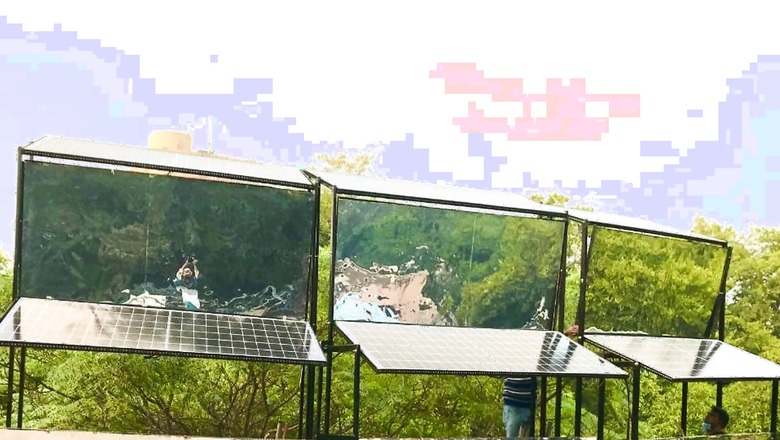
views
An IIT Delhi research team led by physicist Prof Dalip Singh Mehta has developed a special high-efficiency, and “shadow-less” solar panel. Without shadow, the panel is able to make most of all its part as the lower solar panel are not shadowed by the top panels, making it more efficient. It is also auto-rotating Solar PV towers for photovoltaic power generation in a given area throughout the day.
“After intensive research, we got success in arriving at the lightweight and cost-effective novel design on mounting Solar PV towers along with high reflectivity mirrors to follow the Sun movement. Both non-mechanical and mechanical solar towers are able to generate 20-25 per cent and 25-30 per cent more power respectively, while utilising only 50-60per cent rooftop space compare to conventional solutions,” Prof Dalip Singh Mehta, physics department, IIT Delhi said.
Read|IIT Hyderabad to Set up Suzuki Innovation Centre to Create Innovations for India, Japan
The developed ‘non-mechanical’ and ‘mechanical’ tracking solar PV towers with reflection concentration are viable for all Indian seasons of the year with high energy density, claims the release from the institute. Another key feature is that the ‘mechanical’ tracking solar PV tower is portable i.e. the entire unit can be mounted on a truck, made functional and taken anywhere to generate power.
The space saving ‘non-mechanical’ and ‘mechanical’ tracking solar PV towers of 3kW and 5kW capacity, are developed by the IIT Delhi scientists. These are scalable to higher capacity with the concept of solar tower array (green energy field).
These solar panels are useful for multipurpose, they can be used at the electric vehicle charging stations, and rooftop power generation. It is also be very efficient for the vehicle-mounted solar tower with solar tracking for power generation that can be utilised for agriculture purpose (Agri-photovoltaics) such as solar water pumping, charging battery for tractors etc.
Along with Prof Dalip Singh Mehta, Dr Mayank Gupta, Virendra Kumar (department of physics), Masood Ali (SeNSE) and Sanjay Ambwani (design department) were part of the IIT Delhi research team. The EP Sunsol Team, which did the installation comprised of Mahadevan R and Dr Hitesh Mehta.
Read all the Latest Education News here













Comments
0 comment